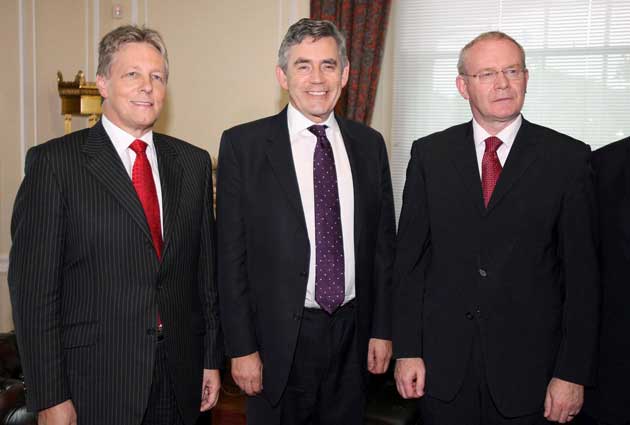Sinn Fein left isolated at Stormont in stand-off with DUP over power-sharing

Stormont remained deadlocked last night, with Belfast's power-sharing executive unable to meet because of continued wrangling between Sinn Fein and the loyalist Democratic Unionist Party (DUP).
Ministers from the four parties which make up the executive were all at Stormont, but Sinn Fein exercised its legal right to halt the scheduled meeting.
Instead, the three other parties – the DUP, the Ulster Unionists, and the Social Democratic and Labour Party (SDLP) – met on an informal basis, as efforts went on behind the scenes to bridge the DUP-Sinn Fein gap which has prevented executive meetings taking place for several months.
Sinn Fein's Deputy First Minister Martin McGuinness got along famously with the former DUP leader Ian Paisley. But he has yet to establish any evident political rapport with his replacement, Peter Robinson, who took over in June.
Mr Robinson has taken a less jovial approach than Dr Paisley, causing Sinn Fein to question his party's commitment to equality in government. The republicans want early movement on the devolution of policing powers to the Belfast administration, but Mr Robinson is resisting this.
Sinn Fein accuses him of doing so under pressure from hardline elements, both outside and within the DUP. Mr McGuinness declared: "There is a real responsibility to ensure that the tail that is wagging the DUP dog is put in its place.
"There is a responsibility to show leadership. We are absolutely convinced that there are people in the DUP, and indeed others, who are hostile to these institutions which Sinn Fein participate in."
Although there is undoubtedly an impasse over executive meetings, the general sense at Stormont is of a roadblock rather than a crisis. Both the DUP and the republicans are strongly committed to keeping the executive going, and are unlikely to push this agreement to the point which might threaten it.
Lines of contact are being kept open, with frequent meetings taking place. Although the executive is not currently meeting, the departments are still functioning and can use various administrative techniques.
Mr Robinson confirmed this when he said: "Each of us, if there is not an executive meeting taking place, I think, will look to urgent procedures because we are not in the business of making people outside suffer. Others will have to answer for themselves."
Other ministers complained that measures dealing with issues such as fuel poverty and suicide prevention could be handled better and more quickly if the executive were to meet.
From one perspective, Sinn Fein look isolated in the dispute, since the three other executive parties all want it to meet. But on the other hand, Gordon Brown, on a recent visit to Belfast, pleased the republicans by saying a timetable should be set for the transfer of policing. The Northern Ireland Secretary Shaun Woodward took a relaxed view of the dispute. "I am rather optimistic actually about how the politics is working here," he said. "There is very clear evidence that on a number of issues; a number of policies, the political leaders are finding their way through very practical issues with practical solutions. Of course it is important that the Assembly meets, it is important that the executive meets, but the timing I believe is less important than the content and the engagement."
The DUP was meanwhile heartened yesterday by its victory in a council by-election in Fermanagh. The party was so anxious to win the seat that it put forward as its candidate Arlene Foster, who is a minister in the executive.
A stalled transfer of power
May 2007: The Northern Ireland power-sharing executive is set up involving the four major Belfast parties, with DUP leader Ian Paisley and republican Martin McGuinness at its head.
February 2008: A council by-election brings a strong showing for Traditional Unionist Voice, a hardline loyalist grouping opposed to the power-sharing settlement. Mr Paisley's son, Ian Paisley Jnr, resigns as a junior minister amid mounting criticism of his political and business contacts.
June onwards: DUP deputy leader Peter Robinson replaces Mr Paisley as First Minister. The DUP and Sinn Fein fail to agree on a series of issues including when policing powers will be transferred. Executive meetings stop.
September 2008: Gordon Brown visits Belfast to say the IRA is no longer a threat and that a date should be set for the transfer of policing. The DUP resists this. The Northern Ireland Executive was supposed to meet yesterday but the factions remained deadlocked.
Subscribe to Independent Premium to bookmark this article
Want to bookmark your favourite articles and stories to read or reference later? Start your Independent Premium subscription today.

Join our commenting forum
Join thought-provoking conversations, follow other Independent readers and see their replies